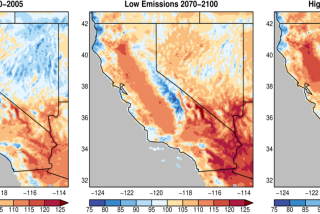Toyota Faces Massive Fines in EPA Battle
- Share via
Threatening a record $60 billion in fines, the Justice Department on Monday accused Toyota Motor Corp. of violating federal clean-air standards and demanded that Japan’s largest auto maker recall 2.2 million of its vehicles.
The federal lawsuit followed Toyota’s unprecedented rejection late last week of a proffered settlement in which the company, fourth in sales in the U.S. auto market, would have paid about $100 million in penalties.
The suit, filed in U.S. District Court in Washington, alleges that Toyota sold cars and light trucks made between 1995 and mid-1997 that were equipped with emissions-control systems that do not properly warn the owners of fuel vapor leaks that could cause air pollution.
If successful, the suit would cover the entire Toyota and Lexus product lines except for their biggest sport-utility vehicles.
“The public cares about driving clean cars,” U.S. Assistant Atty. Gen. Lois J. Schiffer said in a statement after the suit was filed. “Companies that take shortcuts with their vehicle pollution systems shortchange the consumer and our environment. We will hold them accountable.”
Toyota says, however, that it does not believe there is a problem.
“We are proud of our record as an auto industry environmental leader,” said Jim Olson, senior vice president for regulatory affairs at Toyota Motor Sales USA Inc., the auto maker’s Torrance-based U.S. subsidiary. He affirmed Toyota’s belief that the vehicles in question complied with testing procedures that were in effect when they were built.
Industry watchers said they were stunned by the size of the penalties the Justice Department is seeking.
The government has been cracking down on auto makers and in recent years has taken several actions for violations of the Clean Air Act.
Toyota is the first company to refuse a settlement, however, leading some legal and industry analysts to suggest that the huge fine being sought is a sign of federal pique.
“The government was probably caught off-guard by the fact that Toyota did the unprecedented thing by saying it wouldn’t pay a fine and would take its chances in court,” said Wes Brown, an industry consultant with Nextrend in Thousand Oaks. “So the government said, ‘Fine, then we’ll make an example of you.’ ”
It is difficult this early in the game to know whether the government is serious about the fine, said Jody Freeman, a UCLA professor who specializes in environmental law.
“In this case, the Justice Department is taking a tough position,” she said. “But it is difficult to say whether the government is trying to make an example of the company or trying to get them back to the bargaining table.”
Toyota has said it met all standards that existed when the California Air Resources Board approved the firm’s computerized emissions-sampling system in 1995 based on laboratory tests.
A field test by CARB in June 1997, however, revealed that the system didn’t take samples frequently enough to always trigger a dashboard-mounted “check engine” emissions warning light. That began the state and federal effort to get Toyota to fix the cars built in the 30 months between the two tests.
The auto maker adjusted the computer program after the field test and does not have problems with vehicles built for sale in the U.S. after June 1997, a Toyota spokesman said.
But it would cost the company about $250 a car--$550 million total--to recall all the vehicles made before then and replace the tamper-proof emissions-control computers.
Charging the government with attempting to enforce its rules retroactively, Toyota has vowed to fight both the federal suit and a separate bid by CARB to force the company to recall 330,000 cars and light trucks sold in California during the same period.
“This seems to be sue-the-auto-companies week,” said David Healy, an auto industry analyst with Burnham Securities.
He was referring to a $4.9-billion jury award in Los Angeles on Friday to six people who were burned when the gas tank on their 1979 Chevrolet Malibu exploded in an accident. GM has said it will appeal the award, which included $4.8 billion in punitive damages.
Also Monday, a Northern California jury said that Ford Motor Co. should pay about $295 million to the family of three people killed in a 1993 accident involving their Bronco.
In the Toyota case, the Justice Department is suing on behalf of the Environmental Protection Agency.
The agency’s previous largest civil penalty was about $1 billion, levied against the nation’s diesel truck engine makers last year for alleged violation of clean-air standards.
Toyota, however, argues that neither the EPA nor CARB is claiming it tried to evade compliance with the rules.
“This is not a disagreement over clean air or the performance of an emissions system so much as a question of an agency’s right to change regulations after the fact, reinterpreting them to fit their agenda,” Toyota’s Olson said.
In addition to seeking recall or requiring extended-warranty coverage for the 2.2 million Toyota and Lexus cars and light trucks in question, the government complaint asks for penalties of up to $27,500 per vehicle.
In previous cases, Honda Motor Co. paid $17 million last year to settle California and federal charges that involved on-board systems designed to monitor emissions; General Motors paid an $11-million fine, agreed to spend $34 million on anti-pollution programs and recalled 470,000 Cadillacs in 1995 to settle charges that it tampered with emissions-control computers on cars sold between 1991 and 1995; and Ford last year agreed to pay $6.3 million in fines and costs for pollution-control problems on 60,000 of its 1997 Econoline vans.
Times staff writer Davan Maharaj and Sheila Kern of The Times’ Orange County editorial library contributed to this report.






